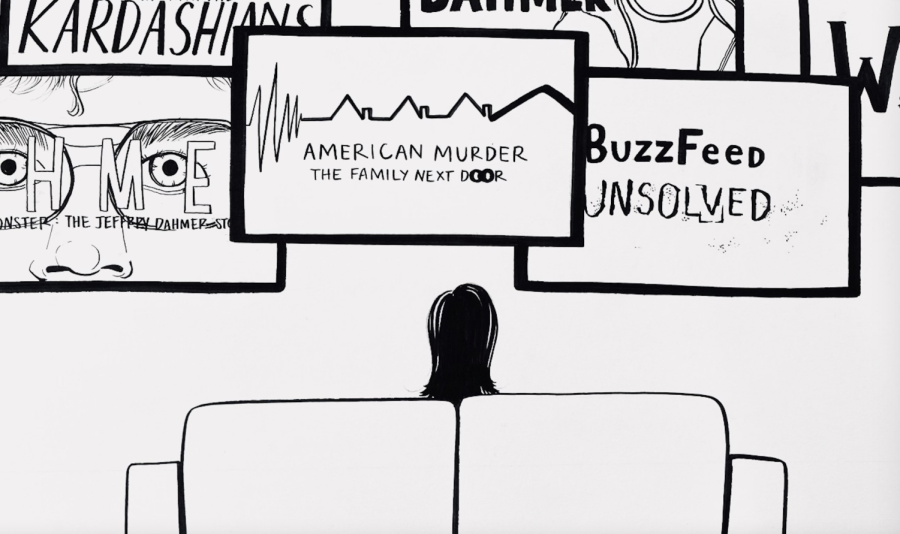True Crime Media Is More Popular Than Ever. But Is It Ethical?
Content Warning: Murder, gore, cannibalism, domestic abuse
Besides the occasional Harry Styles poster, many of us don’t exhibit signs of developing parasocial relationships with celebrities. Of course, Kim Kardashian, Lindsay Lohan and Taylor Swift, who’ve all had their fair share of stalkers, would argue fan behavior goes a bit beyond wall decor. Luckily, fan entitlement (the idea that a fan is entitled to personal details of a celebrity’s life) is only seen in a small portion of fandoms.
But how small is that portion, really? With 3.5 million people watching at its peak, the Johnny Depp vs. Amber Heard trial quickly exposed how the lines of fan culture can be blurred. The public acted as a metaphorical jury which Heard and Depp had to win over, and they quickly took sides. Many rapidly became infatuated with the “characters” of the trial, particularly Camilia Vasquez, Depp’s lawyer; one woman on Tiktok @tattooedingenue even went so far as to tattoo an illustration of her onto her leg, almost like one would with a favorite character from a TV series. This fascination turned into a nation-wide fandom, as countless articles explored the idea of a relationship between Depp and Vasquez, and Tiktok accounts made fan edits of her interrogating Heard. Only four months after June 1, 2022, when Depp won his defamation trial against Heard, Tubi produced and released Hot Take: The Depp/Heard Trial.
To Johnny Depp, Amber Heard, and their respective lawyers, this trial was their legal means of working out a defamation claim that Depp was an abuser. To much of the world, it was pure entertainment. The rapidness of which Hot Take: The Depp/Heard Trial was created grossly highlighted how quickly corporations rush to capitalize on the stories of others. For Heard and Depp, the trial may have been traumatic; for Tubi, it’s just television.
But still, why is it different to be a fan of reality TV show Keeping Up With the Kardashians, for example, than to be a fan of the Johnny Depp vs. Amber Heard trial movie? Aren’t they both pieces of media meant to be consumed? The corporations releasing such titles certainly think so. Netflix’s series on serial killer Jeffrey Dahmer, Monster: The Jeffrey Dahmer Story, stars Evan Peters as the titular character and explores Dahmer’s gruesome cannibalistic crimes against mainly young boys and men of color as well as the institutional failures of the police that allowed his murderous spree to continue in plain sight for over a decade. The show was of course tagged by Netflix with descriptors such as “ominous” and “dark”, but “LGBTQ” was certainly for many, a surprising choice.
The choice to tag the series with “LGBTQ” ensured that any consumers looking up “LGBTQ” in Netflix would find Monster: A Jeffrey Dahmer Story, a gruesome series depicting the brutal murders of LGBTQ men, alongside shows like Heartstopper, animated kid’s series She-Ra and the Princesses of Power, and Schitt’s Creek, stories that focus on undoubtedly much more positive representation. After intense backlash, the tag was taken down, but its existence exposes what Netflix truly thought about their new show. That it was just that: another show.
Just like Ross Lynch playing Dahmer in 2019, and Zac Efron acting as Ted Bundy in Extremely Wicked, Shockingly Evile and Vile, the public seems to be fixated on a new serial killer: Evan Peters in Monster. Many have taken to arms on social media platforms like Tiktok and Twitter proclaiming how “hot” they think he is, playing clips from the show in an attempt to validate their point. Others have taken to bragging about how fast they binge watched it and how unaffected they were. In a video now taken down, one woman who goes by the handle @kirsten.soap on Tiktok wore homemade Jeffrey Dahmer earrings as she described how “bummed” she was that the show’s re-enactment of the brutalization of those LGBTQ men of color “didn’t show the actual morbid parts.”
Thankfully, many Lakesiders disagree with the fandom surrounding Jeffrey Dahmer. One anonymous student responded in the Tatler Poll: “It’s disgusting and exploitative… the amount of people (primarily white women) who enjoy the show saying stuff like ‘I wish it was more gory’ [and] ‘I didn’t find it that scary’ is abhorrent. True crime has gone WAY too far and this needs to be addressed.”
So, what does it mean to be a fan of Monster? Certainly it does not mean the same thing as being a fan as American Psycho, the completely fictionalized story of serial killer Patrick Batemen. How we consume true crime media ethically is often seen as a gray area, but the notion of a fan of fact versus a fan of fiction is entirely black and white. You are not entitled to the raw details of the victims’ lives of whom these shows and movies are based off of; you are not able to critique how “gruesome” or “not gruesome” it is. You are not allowed to be “unphased.” But somewhere in the public’s love for true crime, the idea that they are loving fact and not fiction is lost; the differences between American Psycho and Monster have been overlooked.
True crime doesn’t just manifest itself in the 5 p.m. news every day — instead, true crime manifests itself in media we ingest:the movies and TV shows we watch, the podcasts we listen to in the car. We consume it and it appears it has begun to consume us in return. Somewhere as a society, we have not only become fascinated with true crime; rather, we have begun to enjoy it.
Reagan’s Starting Inventory
x1 classic New York attitude
x1 semi-intact California tan
x1 pair of wired headphones for TV Girl and...

